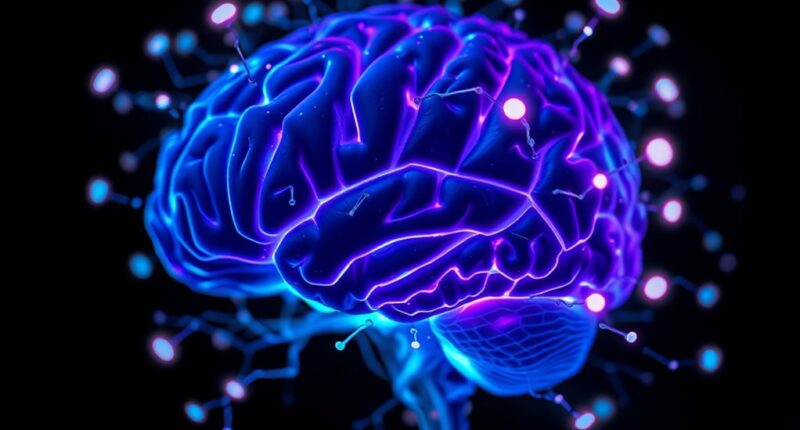When you get notifications, your brain’s threat detection circuits, like the amygdala and insula, activate, which can increase anxiety and lead to compulsive checking. Repeated alerts cause these neural pathways to become hyper-reactive, creating a cycle of stress and overstimulation. To rewire your brain, turning off non-essential notifications and setting specific times for checks helps calm these circuits. Exploring further reveals simple ways to build resilience and regain control over your mental health.
Key Takeaways
- Notifications activate threat-related brain regions like MCC, AI, and PAG, triggering anxiety circuits similar to responses to uncertain threats.
- Frequent alerts lead to neural sensitization, causing hyper-reactivity and exaggerated stress responses over time.
- Overactivation of these circuits reinforces anxiety patterns and impairs emotional regulation and focus.
- Turning off notifications and setting specific phone-check times can reduce neural overactivation and promote brain recalibration.
- Behavioral strategies grounded in neuroscience can rewire neural pathways, decreasing anxiety and enhancing resilience to digital stimuli.

In today’s hyperconnected world, notifications constantly demand your attention, often triggering feelings of anxiety similar to that caused by uncertain threats. When your phone buzzes or pings unexpectedly, your brain’s anxiety circuits spring into action. These neural pathways involve key regions like the midcingulate cortex (MCC), anterior insula (AI), dorsolateral prefrontal cortex (dlPFC), bed nucleus of the stria terminalis (BST), periaqueductal gray (PAG), and dorsal amygdala. Both certain threats, like a direct danger, and uncertain threats, such as a notification, activate overlapping areas, especially the PAG, BST, MCC, and AI. This overlap suggests your brain processes these signals similarly, whether they’re immediate or unpredictable. The difference lies in the intensity and duration; uncertain threats tend to produce sustained activity, particularly in the cortical regions like the dlPFC, which are responsible for ongoing anticipation and worry. This sustained neural activity keeps you stuck in a state of anxious vigilance, making it harder to relax or focus.
Your anxiety circuits are designed to help you respond adaptively to threats, but when overstimulated by frequent notifications, they can become sensitized, leading to exaggerated reactions. This sensitization is a hallmark of anxiety disorders, where the brain’s threat detection system becomes hyper-reactive. When you constantly check your phone, your brain perceives each notification as a potential threat, triggering these neural pathways repeatedly. Over time, this can turn into a cycle of heightened reactivity, making you feel overwhelmed or distressed even without actual danger. The neurobiological mechanisms behind this are complex but revolve around the exaggerated activation of these threat-related circuits. The more you expose yourself to notifications, the more you reinforce this neural pattern, which can contribute to chronic anxiety, difficulty concentrating, and mood disturbances. Additionally, research indicates that this neural sensitization can lead to changes in brain plasticity, further entrenching anxiety responses and making behavioral change more challenging.
Research shows that regular exposure to digital alerts can lead to neural sensitization, intensifying your brain’s response to these stimuli. The impact isn’t just neural; it’s psychological too. The unpredictability of notifications mimics uncertain threats, activating anxiety circuits and creating a loop of stress and compulsive checking. This cycle can impair your focus, worsen emotional wellbeing, and even foster social withdrawal. Curiously, managing notification habits can help rewire your brain’s responses. Turning off non-essential alerts or setting specific times to check your phone can reduce the constant activation of anxiety circuits. Such behavioral changes give your brain a chance to recalibrate, decreasing hyper-reactivity over time. While removing notifications might seem counterintuitive and trigger FOMO, it often leads to a calmer mind and better emotional regulation. By understanding the neuroscience behind notification anxiety, you can take conscious steps to protect and rewire your brain, fostering resilience and mental clarity amidst today’s digital chaos.
Frequently Asked Questions
Can Notification Anxiety Be Completely Eliminated?
You wonder if notification anxiety can be completely eliminated. While total eradication is unlikely due to ingrained brain responses and social pressures, you can considerably reduce it. Consistent practices like mindfulness, stress management, and behavioral changes help rewire your brain over time. By gradually decreasing emotional triggers and managing habits, you’ll lessen anxiety. Remember, progress takes patience, and some residual feelings may remain, but improvement is definitely within your reach.
How Does Notification Anxiety Differ Across Age Groups?
You might notice that notification anxiety impacts younger and older adults differently. Younger people tend to worry more about alerts, feeling higher psychological distress, while older adults often experience less worry and have better coping skills. As you age, your sensitivity to notifications may decrease, and you might interpret alert signals as normal or less threatening. This shift can make notification anxiety less intense and more manageable over time.
Are There Specific Neurotransmitters Involved in Notification Anxiety?
You’re curious about which neurotransmitters play a role in notification anxiety. When you experience this type of anxiety, your brain’s serotonin, GABA, and norepinephrine are involved. Serotonin helps regulate mood, GABA reduces excitability, and norepinephrine triggers stress responses. Notifications can cause dopamine release, reinforcing the behavior. Understanding these chemicals helps you see how your brain reacts to constant alerts, and managing them can reduce your anxiety.
What Role Does Genetics Play in Notification Anxiety?
Genetics play a significant role in notification anxiety, with twin studies estimating heritability at up to 70% for recurrent cases. You inherit genetic variants, like those in the serotonin transporter gene (5-HTT), that influence stress responses and emotional regulation. These genes interact with environmental factors, such as exposure to digital stressors, shaping your vulnerability. So, your genetic makeup partly determines how intensely you react to notifications and related anxieties.
Can Lifestyle Changes Prevent Notification Anxiety?
You wonder if lifestyle changes can prevent notification anxiety. While there’s no direct proof yet, adopting healthy habits like regular exercise, good sleep, and balanced eating can reduce overall stress and digital reactivity. Staying socially connected and practicing mindfulness also help build resilience. By making these adjustments, you lower your chances of developing anxiety triggered by constant notifications, creating a more balanced and less reactive brain environment.
Conclusion
If you don’t tackle notification anxiety now, you might find your brain turning into a chaotic whirlwind of constant distraction, unable to focus on anything truly important. Imagine a mind so overwhelmed by pings and alerts that it forgets how to think clearly—like a computer virus taking over your thoughts. But the good news? You have the power to rewire your brain and break free from this madness. Take control today, or risk losing your mental clarity forever.








